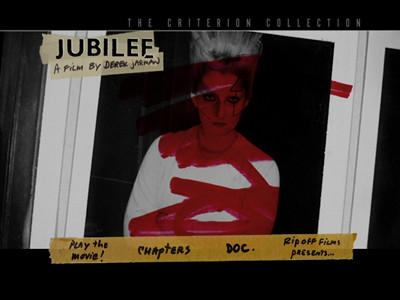
Having recently had a chance to review the forthcoming DVD release of Derek, Isaac Julien, Tilda Swinton, and Colin MacCabe's documentary portrait of the filmmaker, activist, and artist Derek Jarman, I felt it was high time I finally watch my DVD of Jubilee. It has only taken me, oh, five years since Criterion dropped their 25th-anniversary edition, but honestly, I bet I have unwatched DVDs older than that. Such is the addiction.
A large part of why I likely steered clear of Jubilee is I really don't understand the post-apocalyptic genre. If the world were to be decimated tomorrow, the survivors would suddenly start dressing like it's 1977 why, exactly? I watched Neil Marshall's Doomsday
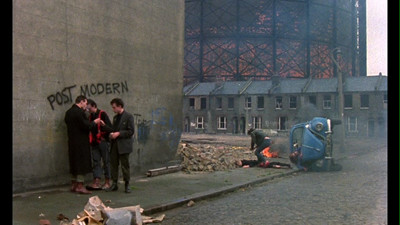
Of course, this digression is unfair to Derek Jarman, who actually made Jubilee in 1977 during the Silver Anniversary of Queen Elizabeth II, and his low-budget film is as much a snapshot of the rebellious culture of the time as it is a critique of the state of the union. The mohawks and leather were what his actors were actually wearing in their everday lives rather than the dream of some costume designer lurking in the shadows. Unfortunately, while I find this to be a good revelation as far as Jubilee was concerned, I was otherwise disappointed with the rest of the movie. Here I liked the aspect of it I thought I would hate and didn't like much else.
The set-up for Jubilee is that Elizabeth I (Jenny Runacre), concerned with the kingdom she is building, asks her astrology advisor, John Dee (Rocky Horror-creator Richard O'Brien), to show her what the future will be like. Dee summons the angel Ariel (David Haughton), and he takes the Queen and her fortuneteller through time to a future England where everything is falling apart. The media is controlled entirely by the maniacal Borgia Ginz (Orlando), and the fortune he has amassed is allowing him inroads into the government. Jews, blacks, and homosexuals are all being exiled to specific areas, and law and order has become a joke. People don't care about art, just the latest episode of "Top of the Pops."
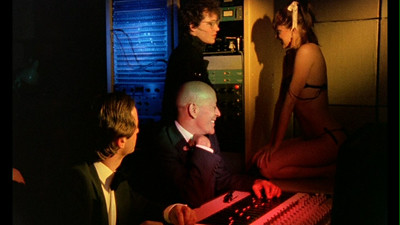
Living on the streets, however, are true rebels, the people whom Jarman sees as embodying the variety and the creativity of England. Essentially, this is Jarman capturing the punk scenesters of the time, and the film is populated with notorious personalities that should be familiar to fans of the era. Jordan, a fashion figure who was part of Malcolm McLaren and Vivienne Westwood's clothing shop, plays Amyl Nitrate, a historian and kitsch collector who wants to record the true history of England before it's swept under the carpet, a document that questions accepted wisdom and how it's colored by hindsight. (For instance, is Churchill really the hero and Hitler the villain, or were those just the roles assigned by the victor in this scenario?) Bad girl Toyah Willcox is Mad, a pyromaniac who embodies the "No Future" ethos of punk and would rather continue to tear the world down than build it back up. And future popstar Adam Ant plays the Kid, a true-to-life portrayal of an ambitious young singer who wants to be on television. Infamous cross-dressing performer Wayne County also appears in a minor role as one of Borgia's stable, and the all-girl band the Slits play a street gang seen trussing up a tearful debutante.
Somewhat loose in terms of plot, Jubilee cuts back occasionally to Elizabeth following the Angel around, but mainly sticks to this underground movement, to the decadent night clubs and the recording studios and the violent acts of self-expression. The girls are lead by Bod, who is also played by Jenny Runacre and placed as a sexless contemporary analogue to Elizabeth. As things get worse around her, Bod starts pushing her cohorts to more revolutionary action, eventually sparking a wave of violence after doling out some payback on a pair of police officers who brutally murdered the Kid and a gay couple squatting in the same bedsit as the girls. As concrete as those events may sound, there is a lot of episodic meandering on the way there, and not much happens while we're waiting around for the first Molotov cocktail to explode. I should note, though, that just as the attacks are getting underway, there is one rather effective scene with Toyah Wilcox. When her character, Mad, finally gets to unleash all of her pent-up anger by attacking one of the cops, she ends up breaking down, shocked by her own actions. It's a powerful moment, and Wilcox goes through a torrent of emotions. Her moment of humanity lingers with the viewer, making what is to come all the more shocking by how quickly that moment passes.
Don't expect much more than that from Jubilee's performers, though. Most of the rest of the "acting" is little more than posing and preening. Orlando stands out as Borgia simply by being so over-the-top as to practically be in his own movie, and the Queen Elizabeth scenes have a shade more technical polish than the rest, but that's about it. The overall look of the movie is shabby chic, which isn't atypical for cheap exploitation pictures nor for anything tangentially punk. As a kind of document of the scene, employing sets and clothes as found objects, the movie succeeds; as an ageless film or a compelling narrative, not so much. Derek Jarman's direction is similarly amateurish, as he is still struggling with film language here. Individual scenes may work of their own accord, but rarely in concert with one another.
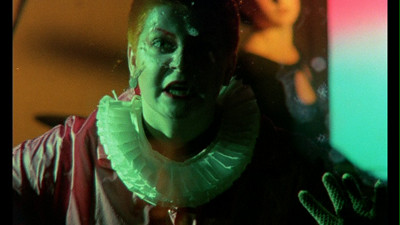
In Jubilee's climactic eruption, Jarman correctly predicts the changing political tide that will make way for Thatcher to take power and the gloom of the 1980s. He also sees the coming downfall of punk. The scene will eventually do the exact thing it professes to hate and totally sell out. (In its way, Jubilee is kind of an ironic part of that, having been turned into a punk picture rather than a documentary about Jordan, since Jarman's producers thought punk was a trend worth cashing in on.) Just as Bod, Amyl, and Mad end up camping out with Borgia on his newly acquired aristocratic estate, sharing a couch with the retired Adolph Hitler, so too will the punk kids get in bed with the corporate fatcats, turning a genuine youth movement into a commodity. As Borgia rightly says, "They all sign up in the end one way or another."
It's a rather cynical conclusion for someone like Jarman, who never gave in and always stayed politically active in his own life, fighting for gay rights throughout the 1980s. The man behind the movie makes me want to be kinder to it than I might otherwise, and the incisiveness of his commentary and his willingness to express it regardless of consequence or how it might have run counter to his own political desires is to be commended. Though time has made Jubilee seem clumsy and slipshod, I can actually see how it would have been subversive in 1977. I think a problem a lot of art of this kind faces is that what once seemed gutsy eventually comes off looking safe, sometimes for the very fact that it inspires the same kind of courage in others, and their efforts make the original come of as been-there-done-that. The message is still relevant, especially as the gulf between big media and big government and the people both are supposed to serve gets wider by the day, it's just that the medium no longer fits.

Even so, as a time capsule of British punk, you're not going to find much that is as raw and as of the moment as Jubilee. If you have any interest in the period, then you will find something to appreciate. In addition to songs by Adam Ant and Wayne County, there are also songs by other bands of the era, some obscure (Maneaters, Suzi Pinns, Chelsea, Amilcar) and some not as obscure (Siouxsie and the Banshees). The main score is also by Brian Eno, an innovator from the glam era, and his music for Jubilee serves as an aural bridge between that movement and the one that was replacing it, like the ties that bound his earlier band Roxy Music to U.S. punk godfathers the New York Dolls. Jubilee also shows a lot of the same kind of rejection of technical proficiency that launched a thousand bands by proclaiming one need not learn how to do what they are setting out to do. If you can still listen to obscure punk 45s from the late '70s and enjoy them for the pure visceral thrill of a bunch of kids banging on their instruments and not worrying too much about what came out, then you might not have the same problems with Jubilee that I did. For you, its low-fi sins could just as easily be virtues.
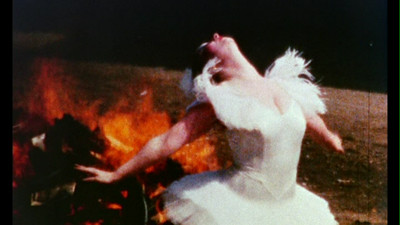

4 comments:
I feel like you don't give the movie enough credit in terms of plot. The point of Jubilee is a critique of the punk movement, exposing it for what Jarman saw it as--hypocritical. Punk, as anti-establishment, embraces the largest establishment of all--capitalism, embodied by Mr. Ginz. Humorously enough, Mr. Ginz looks an awfully lot like Michel Foucault, a semblance that is especially humorous during Borgia's speech about controlling information and thus gaining power.
These group of outsiders, while on the first glance seem nihilistic, are actually searching for some value system. On the quest for nothing, they found it, and now they want something more. Take, for example, the scene where Crabs suffocates her hook-up and then after laments how she might have lost "her true love". While rejecting traditional values they are searching for those same values--not that I think Jarman is pushing traditional values, just that we should question the punk mantra. This is why Westwood despised the film, because it exposed her whole operation, she and McLaren will now openly admit that punk had been created to market "trousers" to kids. (That said, I think Westwood is a genius, insane, but genius nonetheless.)
The episodic nature of the movie only heightens the point that people become passive in their lives, a life divided into segments like the TV programs that raised them.
It's interesting that this film, to me, seems at once Foucauldian, Derridean, and Platonic (there are more allusions to the allegory of the cave than I care to count), but all-in-all I think it's great raucous fun.
As for the lo-fi aesthetic... matter of taste, I love it personally.
The reviewer waited five years to watch a costly DVD he purchased, of course he isn't going to understand the film; he's pretentious.
Ha ha ha! Oh, Anonymous. Irony is so cute!
You're right that is cute, its as if you came up with it all by yourself!
You deserve a special sticker for your accomplishment.
Post a Comment